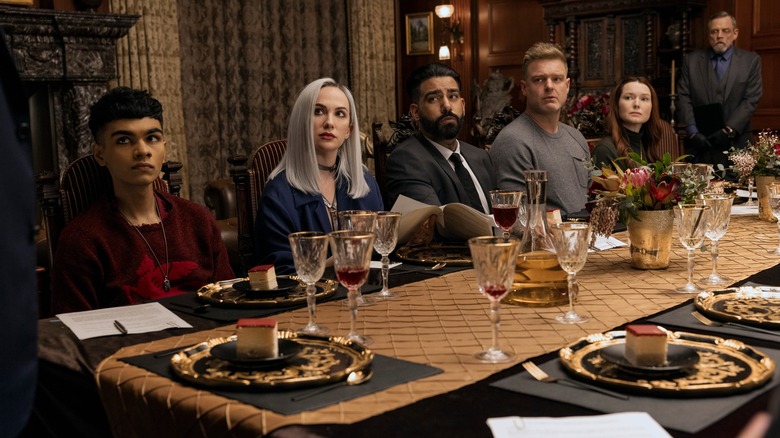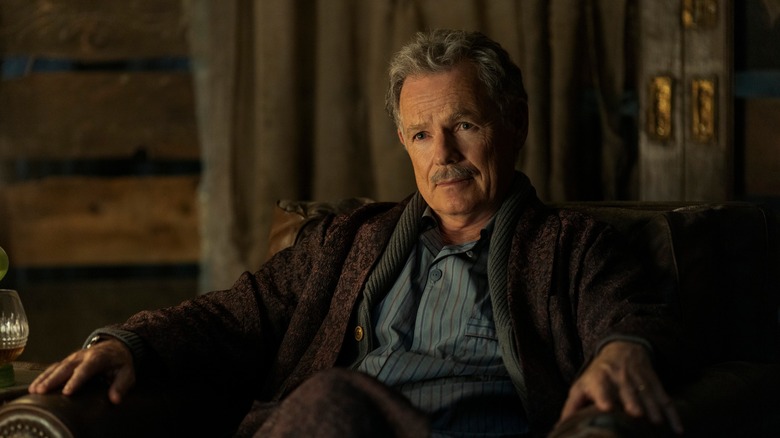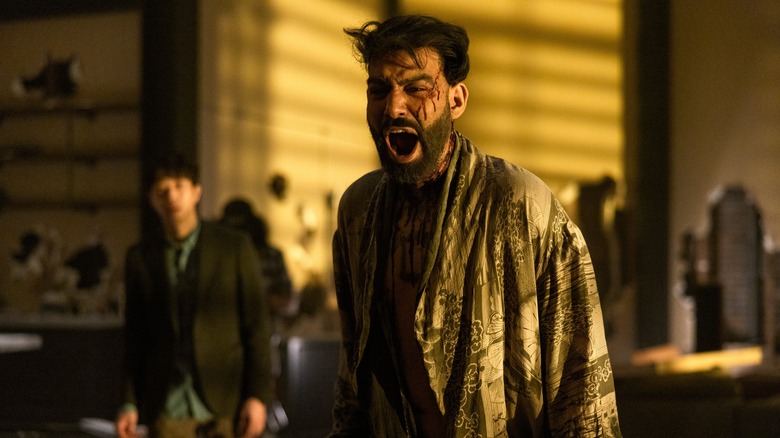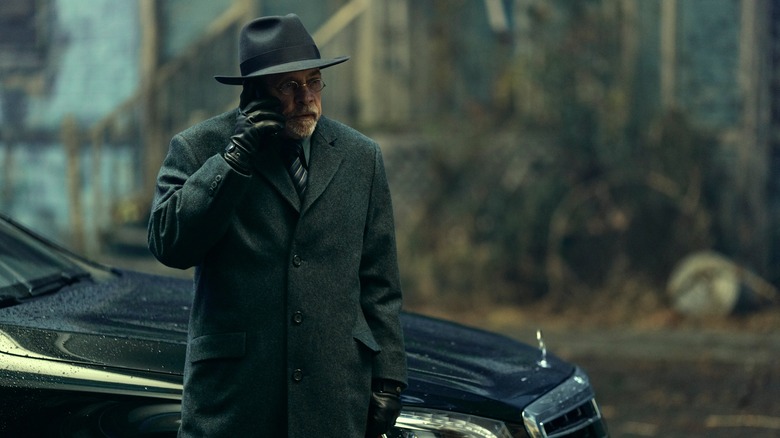What Is The Fall Of The House Of Usher Really All About?
This article contains spoilers for Season 1 of The Fall of the House of Usher
Many of the best horror stories succeed not just because of how effective and frightening they are, but also because of how the themes and the terrors of their tales correspond with our own fears. In fact, Mike Flanagan's previous works are rife with metaphors that correspond with the real-life ghosts and demons that many people have faced, like the childhood trauma of "The Haunting of Hill House" or the parallels with addiction and guilt seen in "Doctor Sleep" and "Midnight Mass."
However, the writer-director's latest is his most densely packed tale yet when it comes to exploring the evils of the real world. As has been noted by many outlets, the Usher family in "The Fall of the House of Usher" appears to be heavily inspired by the Sackler family. The Sacklers are the inventors of Oxycontin and are widely believed to be at least partially responsible for the opioid crisis.
So far, the opioid crisis has claimed over 600 thousand lives, and it is thought even by one branch of the Sackler family itself that misleading advertising and deliberate obfuscation of the effects and addictive nature of the drug are important factors in the opioid crisis. Still, it's how the Sacklers parallel with the Ushers in "The Fall of the House of Usher" and their haunting legacy that makes the show so effective.
There is a powerful message at the heart of Flanagan's latest
In the final episode of "The Fall of the House of Usher," Verna (Carla Gugino) appears to haunt Roderick Usher (Bruce Greenwood) a final time and shows him his true legacy. With all of his kids dead, Roderick stares out the window at a storm and realizes that every raindrop is actually a dead body falling from the sky and that he and his painkiller are responsible for all of this pain, suffering, and misery.
While this might be the clearest indication of how the two families are drawn together between fact and fiction, "The Fall of the House of Usher" also contains plenty of references to another global crisis. As a central theme of the series is kicking the can down the road and passing on our troubles to the next generation, the Netflix series points out how so many of us are willingly dooming our own children and grandchildren by ignoring climate change and the gradual destruction of our home planet.
As Verna herself notes, it would be but a pittance in terms of global wealth to solve long-running crises like houselessness, climate change, and other major issues, but those in positions of power don't care enough to make this happen. Furthermore, Mike Flanagan isn't shy about pointing out his own complicity in this system, or Netflix's for that matter.
Mike Flanagan doesn't seem to be too optimistic about humanity
One particularly pointed line from Verna suggests that even if we stopped spending billions of dollars on new television shows and movies for even a single year, we would likely be pretty far down the road in terms of making the Earth a better and more livable place for everyone, regardless of their wealth and status.
However, as characters like Verna and Arthur Pym (Mark Hamill) show in "The Fall of the House of Usher," Mike Flanagan himself doesn't seem to hold out much hope that humanity can right the ship. As Madeline (Mary McDonnell) coldly says toward the end of the series, "They want us to give them a world without pain, and then they hate us for giving it to them."
More succinctly, when Camille (Kate Siegel) is facing inescapable death at the end of the third episode of "The Fall of the House of Usher," she shows absolutely zero contrition, with her final words being, "F*** it, I got mine." Still, it's Arthur who really lays it all out in the end when he meets Verna face to face.
Arthur offers the coldest calculations about our future
The fixer for the Usher family calls humanity a virus. He explains how his long life and worldly travels have only served to reinforce his belief that humans are a sickness for the planet and that we will likely lead to its demise. He also shows no optimism when it comes to changing things or doing better for himself, so much so that he turns down Verna's offer to make his legal troubles go away.
Arthur refuses to push his troubles down the road, saying that he would rather die than cede control over his life. As such, Arthur is the only member of the Usher dynasty who finally ends up going to prison, which is probably a preferable fate when you see how the other characters in "The Fall of the House of Usher" meet their ends.
Now, with Mike Flanagan's upcoming take on another story about doomed humanity and our obsession with legacy, "The Dark Tower," in the works, the filmmaker and showrunner has more than shown himself capable of facing down the darkest demons in our collective closets. While this may bode well for the upcoming Stephen King adaptation, it may not necessarily provide as much comfort to us as denizens of the real world. In fact, many of them share Flanagan's clear dread about what's to come.



